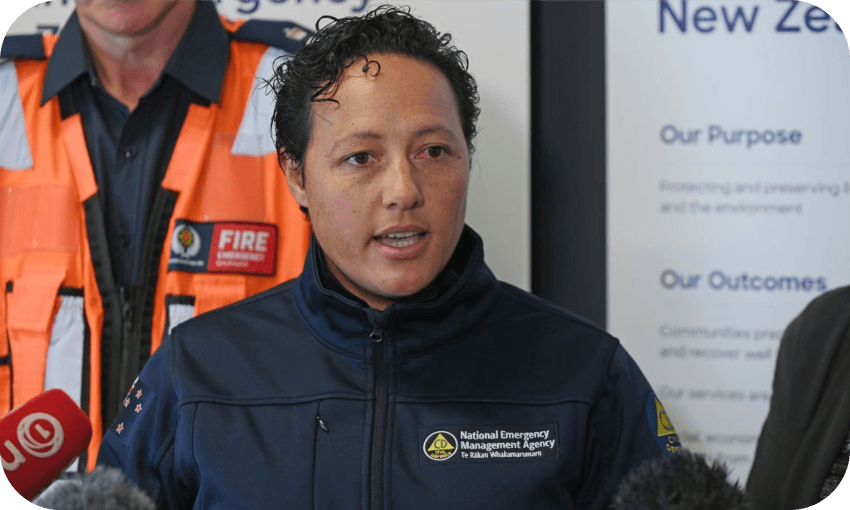The East Coast MP has been on the ground in her electorate since Cyclone Gabrielle’s devastating arrival. She tells Stewart Sowman-Lund how the community is grappling with the extensive clean-up.
We’ve all seen the pictures, but only those on the ground in the most devastated areas will really know what the aftermath of Cyclone Gabrielle has been like.
One of those is Kiritapu Allan, the local MP for the flood-hit Tairāwhiti region. The former emergency management minister, she’s used to tackling the aftermath of a crisis. And, grounded in her electorate, one of the country’s largest, Allan has spent as much time as possible on the road – “everywhere from Ruatāhuna, Murapara, Whakatane, through to Tolaga [and] Te Karaka”.
Today she’s in Gisborne where she found time in her busy morning media round to speak to The Spinoff. So how has the last week been? In a word, tough – but Allan, reflecting the prime minister’s pledge to “build back better”, says from a disaster comes both opportunities and challenges. “You’re dealing with communities that have lost absolutely everything. You’re dealing with people that have lost their houses for the second time in their life, first in Bola and now in Gabrielle,” said Allan. Of her time in the region, Allan said her role has been mainly to listen. “The first couple of days it was really just sitting in communities and letting people grieve.”
As an MP – and more importantly a cabinet minister – being on the ground has meant she is the most direct link between Tairāwhiti and the Beehive. The mood on the ground has been dynamic, every hour and every day bringing different issues. In among the traumatic and terrifying news stories emerging from the worst-hit areas have been stories of communities rallying together. “You see the best of people in the worst of times,” Allan said. “We’ve seen people with nothing be wrapped around incredibly well by strong, staunch communities. And we’ve seen the leadership within those communities demand more when they need more.”
Her tiki tour of the east has highlighted some of the bigger infrastructure issues, with Allan singling out the loss of cell phone connectivity and internet access, damage to roads, and treatment of water. A water conservation notice was issued for Gisborne before the weekend due to the failure of a back-up water treatment plant. That’s just the start of it. “It’s been an all-cash economy here. That’s been our environment for the past seven days,” she said.
And while the word “resilient” has cropped up in numerous reports, it’s not a word Allan herself will use – other than to explain to me why she dislikes it. “I hate that word ‘resilient’… I’ve been a member of parliament for six years. Over the past one and a half years we’ve had, I think, eight states of emergency and I cannot count the number of events we’ve had in terms of critical infrastructure going out as a consequence of severe weather events. Yes our people are resilient, yes they are strong, yes they know how to look after themselves and wrap around each other – that’s what this environment fosters,” Allan said.
“But there is something that’s imminent for all of us to be thinking about now: what does it take to adapt to future weather events that will come in just a day, or a week or a month? These are the challenges that are at forefront of our collective mind, our government’s mind. What does it mean to adapt? How do we make sure we’re future-proofing.”
View this post on Instagram
The coming days will continue to be an “all hands to the till” response, said Allan, ensuring that “the dots have been connected” between central agencies and the civil response. That includes keeping on top of concerns the post-cyclone atmosphere is making it easier for opportunist criminals to loot and steal crucial supplies. “In the Gisborne region, I’ve seen stories of police officers personally escorting retailers directly to the banks to provide that level of safety and security,” Allan said. “I absolutely accept people are anxious and I just want to commend the police on doing everything they can to help manage those anxieties in our communities.”
And while the challenges are ever-present and fatigue is setting in, Allan said her community has dealt with its fair (or perhaps unfair) share of crises. “It’s a role we’ve come to know – all of us in this community. And it’s another day at the office really.”
Follow Gone By Lunchtime on Apple Podcasts, Spotify or your favourite podcast app.





